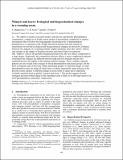| dc.contributor.author | Dutkiewicz, Stephanie | |
| dc.contributor.author | Scott, Jeffery R. | |
| dc.contributor.author | Follows, Michael J. | |
| dc.date.accessioned | 2015-07-22T18:21:25Z | |
| dc.date.available | 2015-07-22T18:21:25Z | |
| dc.date.issued | 2013-05 | |
| dc.date.submitted | 2013-04 | |
| dc.identifier.issn | 08866236 | |
| dc.identifier.uri | http://hdl.handle.net/1721.1/97887 | |
| dc.description.abstract | We employ a marine ecosystem model, with diverse and flexible phytoplankton communities, coupled to an Earth system model of intermediate complexity to explore mechanisms that will alter the biogeography and productivity of phytoplankton populations in a warming world. Simple theoretical frameworks and sensitivity experiments reveal that ecological and biogeochemical changes are driven by a balance between two impacts of a warming climate: higher metabolic rates (the “direct” effect), and changes in the supply of limiting nutrients and altered light environments (the “indirect” effect). On globally integrated productivity, the two effects compensate to a large degree. Regionally, the competition between effects is more complicated; patterns of productivity changes are different between high and low latitudes and are also regulated by how the supply of the limiting nutrient changes. These complex regional patterns are also found in the changes to broad phytoplankton functional groups. On the finer ecological scale of diversity within functional groups, we find that ranges of some phytoplankton types are reduced, while those of others (potentially minor players in the present ocean) expand. Combined change in areal extent of range and in regionally available nutrients leads to global “winners and losers.” The model suggests that the strongest and most robust signal of the warming ocean is likely to be the large turnover in local phytoplankton community composition. | en_US |
| dc.description.sponsorship | United States. Dept. of Energy. Office of Science (Grant DE-FG02-94ER61937) | en_US |
| dc.description.sponsorship | United States. National Oceanic and Atmospheric Administration | en_US |
| dc.description.sponsorship | Gordon and Betty Moore Foundation | en_US |
| dc.language.iso | en_US | |
| dc.publisher | American Geophysical Union (AGU) | en_US |
| dc.relation.isversionof | http://dx.doi.org/10.1002/gbc.20042 | en_US |
| dc.rights | Article is made available in accordance with the publisher's policy and may be subject to US copyright law. Please refer to the publisher's site for terms of use. | en_US |
| dc.source | MIT web domain | en_US |
| dc.title | Winners and losers: Ecological and biogeochemical changes in a warming ocean | en_US |
| dc.type | Article | en_US |
| dc.identifier.citation | Dutkiewicz, S., J. R. Scott, and M. J. Follows. “Winners and Losers: Ecological and Biogeochemical Changes in a Warming Ocean.” Global Biogeochemical Cycles 27, no. 2 (May 20, 2013): 463–477. © 2013 American Geophysical Union | en_US |
| dc.contributor.department | Massachusetts Institute of Technology. Center for Global Change Science | en_US |
| dc.contributor.department | Massachusetts Institute of Technology. Department of Earth, Atmospheric, and Planetary Sciences | en_US |
| dc.contributor.mitauthor | Dutkiewicz, Stephanie | en_US |
| dc.contributor.mitauthor | Scott, Jeffery R. | en_US |
| dc.contributor.mitauthor | Follows, Michael J. | en_US |
| dc.relation.journal | Global Biogeochemical Cycles | en_US |
| dc.eprint.version | Final published version | en_US |
| dc.type.uri | http://purl.org/eprint/type/JournalArticle | en_US |
| eprint.status | http://purl.org/eprint/status/PeerReviewed | en_US |
| dspace.orderedauthors | Dutkiewicz, S.; Scott, J. R.; Follows, M. J. | en_US |
| dc.identifier.orcid | https://orcid.org/0000-0002-3102-0341 | |
| mit.license | PUBLISHER_POLICY | en_US |
| mit.metadata.status | Complete | |

